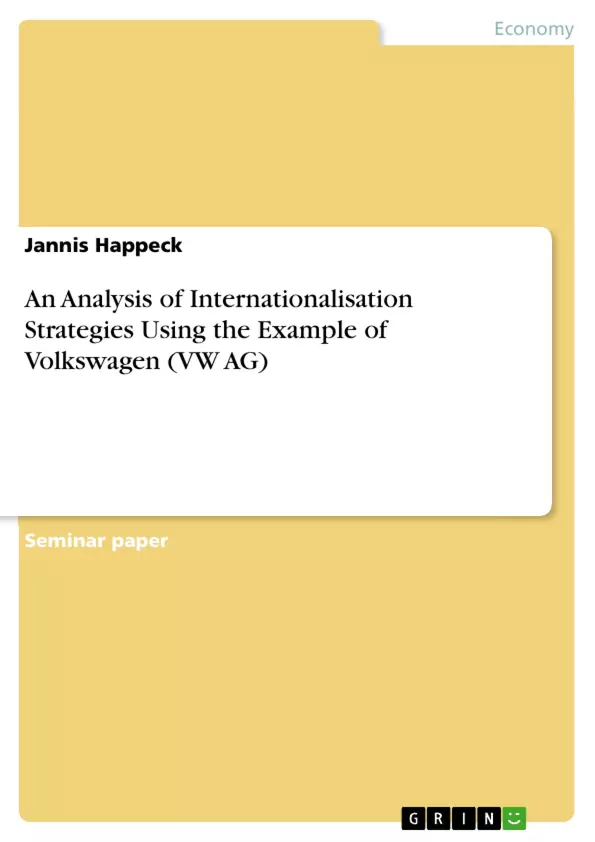This essay analyses internationalisation strategies by using the example of the German automotive manufacturer Volkswagen (VW). First, there will be a theoretical approach to internationalisation by defining the term and explaining the different opportunities and risks of internationalisation.
Following this, essential internationalisation strategies for entering foreign countries and markets will be considered. The main part of the essay will deal with the Volkswagen Aktiengesellschaft (AG) and its internationalisation strategy. Following that, there will be a short description of the historical development of the VW AG before the three main phases of Volkswagen’s internationalisation process and the internationalisation strategy for the Chinese market will be worked out. Finally, the conclusions will summarise the results of this essay.
Inhaltsverzeichnis (Table of Contents)
- 1. Introduction
- 2. Theoretical Approach of Internationalisation Strategies
- 2.1 Definition
- 2.2 Essential Internationalisation Strategies
- 2.3 Motives and risks of Internationalisation
- 3. Volkswagen AG and its Internationalisation Strategy
- 3.1 Short company profile and historical development
- 3.2 Phases of Volkswagen's Internationalisation Strategy
- 3.3 The Internationalisation Strategy of VW illustrated through the example of the People's Republic of China
- 4. Conclusions
Zielsetzung und Themenschwerpunkte (Objectives and Key Themes)
This essay aims to analyze internationalization strategies through the lens of the German automotive manufacturer Volkswagen (VW). It explores the theoretical framework of internationalization by defining the term and outlining the opportunities and risks associated with it. The essay further examines essential strategies for entering foreign markets and delves into VW's specific internationalization strategy, tracing its historical development and outlining its key phases. The analysis culminates in a discussion of VW's strategy for the Chinese market.
- Definition and theoretical framework of internationalization
- Essential internationalization strategies for entering foreign markets
- Volkswagen's historical development and internationalization strategy
- Analysis of VW's internationalization strategy in the Chinese market
- Evaluation of the effectiveness and implications of VW's internationalization strategies
Zusammenfassung der Kapitel (Chapter Summaries)
- Chapter 1: Introduction provides a brief overview of the essay's purpose, which is to analyze internationalization strategies using Volkswagen as a case study. It outlines the structure of the essay and its key themes.
- Chapter 2: Theoretical Approach of Internationalisation Strategies defines the term "internationalization" and explores its various facets. It discusses essential internationalization strategies, including export, licensing, and franchising, while outlining the motives and risks associated with internationalization.
- Chapter 3: Volkswagen AG and its Internationalisation Strategy provides a brief company profile and historical development of Volkswagen. It then outlines the phases of Volkswagen's internationalization strategy and delves into its strategy for the Chinese market.
Schlüsselwörter (Keywords)
The essay focuses on the key terms and concepts of internationalization strategies, with particular emphasis on the Volkswagen AG's approach. The core concepts explored include internationalization definition, motives, and risks, essential internationalization strategies like export, licensing, and franchising, and the analysis of VW's internationalization strategy in different phases and regions, particularly in the Chinese market.
Frequently Asked Questions
What is the focus of the analysis regarding Volkswagen's internationalisation?
The analysis focuses on the internationalisation strategies of Volkswagen AG, specifically examining theoretical frameworks, historical development, and market entry strategies.
How is internationalisation defined in this context?
Internationalisation is defined through a theoretical approach that explores the opportunities, motives, and risks associated with expanding a business into foreign markets.
What are the essential strategies for entering foreign markets mentioned?
The essay discusses essential strategies such as export, licensing, and franchising as primary methods for entering foreign markets.
Which specific foreign market is analyzed in detail for VW?
The People's Republic of China is used as the primary case study to illustrate Volkswagen's internationalisation strategy.
What are the three main phases of Volkswagen’s internationalisation?
The work identifies three distinct phases in the historical development and global expansion process of Volkswagen AG.
What are the risks associated with internationalisation for automotive companies?
The essay outlines various risks including market entry barriers, cultural differences, and economic fluctuations in foreign territories.
- Citar trabajo
- M. Sc. Jannis Happeck (Autor), 2016, An Analysis of Internationalisation Strategies Using the Example of Volkswagen (VW AG), Múnich, GRIN Verlag, https://www.grin.com/document/366656



